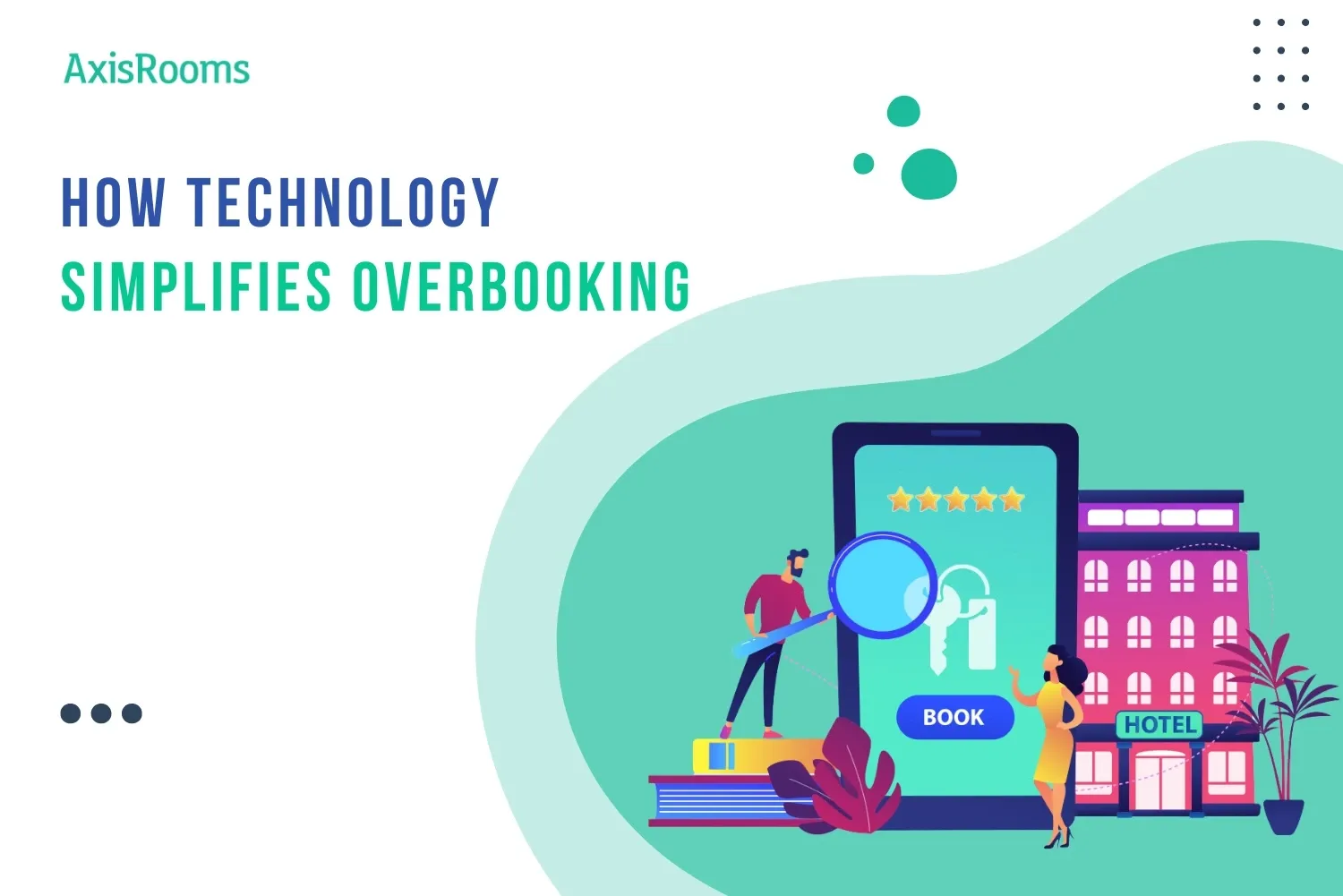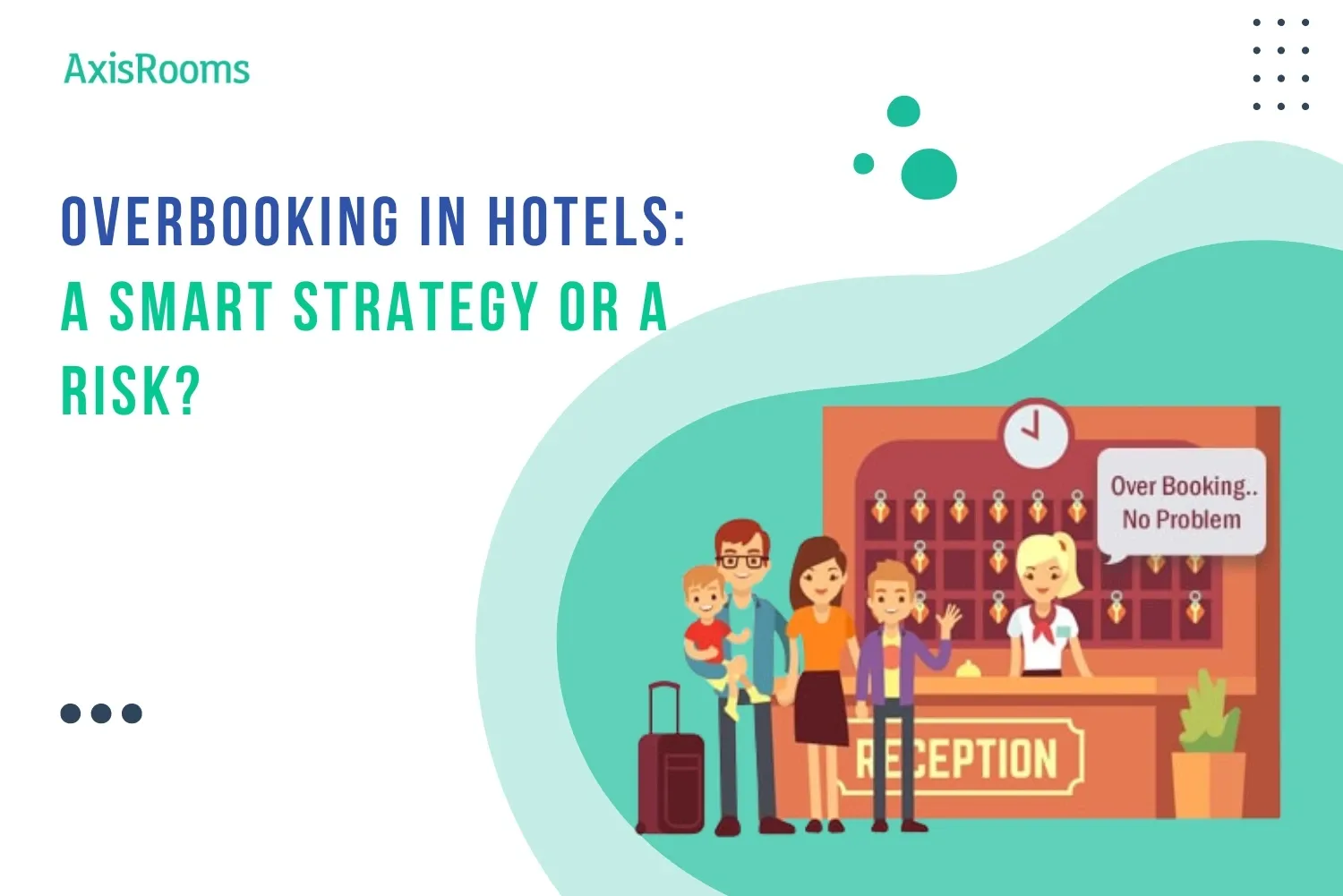Imagine this: It’s peak season, and your hotel is fully booked. You’re celebrating full occupancy until a late-night guest arrives, and suddenly, you’re scrambling to resolve an overbooking situation. Overbooking rooms is often seen as a gamble, but for most hoteliers, it’s a necessary strategy to ensure maximum revenue.
When handled correctly, overbooking can be a winning move that keeps profits flowing and rooms full. However, without a thoughtful approach, it can lead to frustrated guests, bad reviews, and damaged trust. In this blog, we’ll break down why overbooking matters, how to do it right, and the key challenges you need to tackle to balance revenue, KPI in hotels, and guest satisfaction.
Why Overbooking Matters in the Hotel Industry
Overbooking may sound risky, but when managed correctly, it becomes a valuable strategy for driving revenue and staying competitive.
Maximizing Revenue
Cancellations and no-shows are part of hotel life. Without a plan to address them, your unsold rooms turn into unsalvageable losses. Overbooking ensures that you don’t leave money on the table. The goal is simple: accept slightly more reservations than the rooms you have to compensate for inevitable cancellations.
A full hotel equals a profitable hotel. And let’s face it no one likes an empty room that could’ve been sold.
Improving Occupancy Rates
During high-demand periods, overbooking can help optimize occupancy. By factoring in historical data, such as guest trends and seasonality, you can confidently overbook to reach full capacity while still delivering a smooth guest experience.
For example, during events or festivals, smart overbooking ensures your rooms are filled even if there are last-minute cancellations.
Staying Competitive
In highly competitive markets, hotels that manage overbooking effectively stay ahead. It’s not about recklessness but rather about careful planning and execution ensuring you get the revenue you deserve without jeopardizing guest satisfaction.
When done right, overbooking sets your property apart as one that maximizes opportunities while maintaining operational excellence.
The Challenges of Hotel Overbooking
While overbooking comes with rewards, the risks are real if the strategy isn’t well managed.
Guest Dissatisfaction
No guest wants to be turned away or “walked” to another property. It feels like a betrayal of trust, no matter how polite the explanation. For many, this single incident can define their impression of your hotel forever.
Negative Online Reviews
We live in a digital-first world, where one negative review can reach thousands of potential guests. If an overbooked guest feels undervalued or poorly treated, their frustration will spill onto platforms like TripAdvisor or Google Reviews.
Operational Complexities
Managing overbookings requires flawless coordination across multiple booking channels direct reservations, OTAs, and walk-ins. Without proper systems or communication, double bookings can easily spiral into chaos.
The Psychology of Overbooking for Hoteliers
Overbooking decisions often come down to the hotelier’s mindset and priorities.
The Revenue-Centric Approach
For many hoteliers, revenue drives the decision to overbook. Their logic is clear: empty rooms are missed opportunities. By carefully planning and relying on historical data, they can maximize revenue without overstepping.
They see overbooking as a calculated risk. Their mantra: “We’ll prepare for cancellations, but we’ll recover if guests walk.”
The Risk-Averse Approach
On the flip side, some managers are hesitant to risk guest dissatisfaction. To them, a poor experience outweighs short-term revenue gains. They’re cautious about damaging trust and prioritizing long-term loyalty.
The challenge? Finding the sweet spot balancing revenue goals with impeccable guest service.
Key Strategies to Manage Overbooking Successfully
Overbooking can make or break a hotel’s operations; the difference lies in how well you manage it. Thoughtful planning, smart technology, and proactive communication can transform overbooking from a risky move into a strategic advantage. Here’s how you can handle overbooking gracefully, ensuring guests stay satisfied while maximizing occupancy.
Accurate Forecasting is the Foundation
Overbooking isn’t guesswork, it's a science backed by numbers. Predicting no-shows and cancellations starts with analyzing historical data. Look at patterns during peak seasons, local events, or major holidays to understand how many bookings you will likely lose.
For example, if last year’s cancellation rate during an annual music festival was 8%, you can overbook by a similar percentage with confidence. Combine this data with insights into guest behavior like how often business travelers cancel last minute and you’ll build a reliable forecast.
When you rely on data rather than instincts, you’ll minimize risks while ensuring every room generates revenue.
Leverage Hotel Technology to Simplify Management
Here’s how technology keeps you in control:
- Centralized Inventory: Real-time updates ensure your team always knows exactly how many rooms are available.
- Channel Integration: Automatically sync bookings across platforms to prevent double reservations.
- Data-Driven Insights: Analyze patterns to set realistic overbooking limits and manage inventory efficiently.
Imagine this: a guest books a last-minute stay through an OTA, and your system immediately reflects the change. No manual updates, no errors, and no unpleasant surprises. With technology in place, you gain control, transparency, and peace of mind.
Transparent Guest Communication Makes a Difference
Being upfront with your guests is one of the best ways to soften the impact of an overbooking situation. No one likes surprises especially when it means being turned away from a hotel. Proactive, transparent communication can save the day and even leave guests impressed.
If you anticipate an issue, reach out early. Apologize sincerely and offer practical solutions:
- Room Upgrades: Provide a higher-category room if available.
- Alternative Arrangements: Book a stay at a partner hotel and cover transportation costs.
- Perks and Discounts: Offer dining credits or discounts on future bookings.
A simple call or message explaining the situation with empathy can transform frustration into appreciation. Guests don’t just remember problems; they remember how you handled them.
Read More - Strategies for Hotels: Improve Profitability & Guest Loyalty
Train Your Team to Handle Overbooking with Empathy
Your front desk staff will often be the ones handling overbooked situations face-to-face. They need to remain calm, professional and solution-oriented even when emotions run high.
Empower your team with clear processes and empathetic communication skills. They should:
- Acknowledge the guest’s frustration and apologize genuinely.
- Offer quick, practical solutions to minimize inconvenience.
- Highlight the value of recovery options like upgrades or perks to turn the experience around.
For example, imagine a guest is informed of an overbooking issue, but your team offers an upgraded suite at a partner property, complimentary dinner, and a free transfer. The guest may walk away happier than they would’ve been with their original booking. It’s all about how you handle the moment.
Always Have a Recovery Plan
Let’s face it: no matter how precise your planning is, sometimes overbooking will result in a guest being relocated. The true test of your brand’s commitment to service lies in how you recover. A well-thought-out recovery plan is your safety net.
Here’s what a strong recovery plan looks like:
- Offer upgrades for the guest’s next stay to encourage them to return.
- Provide dining or spa credits to add value to their experience.
- Arrange seamless transportation and bookings at a nearby hotel.
A guest who feels inconvenienced but sees your sincere effort to make it right will not only forgive the situation but might become a loyal advocate for your hotel. Recovery isn’t just about solving the problem, it's about turning a bad moment into an opportunity to impress.
How Technology Simplifies Overbooking
Overbooking is a balancing act of risk and reward, and technology ensures you stay on the right side of that balance. Platforms like AxisRooms Channel Manager empower you with data, accuracy, and confidence to make smarter decisions by automating critical tasks.

Managing overbooking manually is a recipe for chaos in a complex hospitality environment where bookings flood in from OTAs, direct websites, and walk-ins. Tools like AxisRooms Channel Manager are the backbone of a smart overbooking strategy, ensuring you stay in control and minimize risks.
Real-Time Inventory Management
Imagine a scenario where a guest books a last-minute stay through an OTA while your front desk accepts a direct reservation for the same room. Without instant updates, double-bookings are almost inevitable. A Channel Manager syncs reservations in real time, ensuring your inventory across Online Travel agencies (OTAs) and direct channels is always up to date and accurate.
Smarter Forecasting with Data Insights
Technology doesn’t just manage rooms; it helps predict booking behaviors. Tools like AxisRooms analyze historical data—cancellation rates, seasonality, and guest trends—to help you set accurate overbooking limits. For example:
- Identify peak seasons with high no-show rates.
- Understand trends like same-day cancellations for business travelers.
- Use past booking data to refine your overbooking strategies over time.
With these insights, hoteliers make data-backed decisions rather than relying on guesswork.
Integration Across All Channels
AxisRooms simplifies inventory management by unifying booking platforms into a single interface:
- Channel Manager: Ensures room inventory is updated instantly across OTAs, GDS, and direct channels.
- Integrated Tools: AxisRooms automates reservations, reduces manual effort, and provides staff with up-to-the-second data.
This seamless integration eliminates the risk of errors and miscommunication, which are common when overbooking is handled manually.
Improved Communication and Guest Recovery
When overbooking does occur, AxisRooms helps hotels respond faster. Tools like the Channel Manager flag potential conflicts in advance, giving your team enough time to notify guests and offer recovery options proactively, whether through automated messages or manual outreach.
For example:
- Preemptively contact overbooked guests to apologize and arrange alternatives.
- Log guest preferences, ensuring recovery solutions (like partner hotel stays or upgrades) meet their expectations.
Benefits of a Well-Managed Overbooking Strategy
When executed thoughtfully, overbooking offers long-term benefits:
- Higher Revenue: No empty rooms means maximized profits.
- Operational Efficiency: Streamlined processes save time and reduce errors.
- Enhanced Guest Loyalty: Thoughtful recovery strategies to enhance the guests loyalty can turn a negative into a positive, winning guests’ trust and future business.
Common Mis-steps to Avoid
Mistakes can be costly. Avoid these pitfalls:
- Guessing Overbooking Limits: Use data, not gut instincts.
- Poor Communication: Always inform and assist guests proactively.
- No Contingency Plan: Be ready with solutions when things don’t go as planned.
Conclusion
Overbooking, when approached strategically, can be a powerful tool to maximize revenue and occupancy. However, it’s a balancing act that requires precision, planning, and a guest-first mindset.
By leveraging accurate forecasting, adopting advanced hotel technology, and maintaining transparent communication, overbooking can shift from being a risky challenge to a smart business strategy. A well-handled overbooking situation doesn’t just fill rooms; it builds trust, loyalty, and lasting guest relationships.
The key lies in preparation, training your staff, having a solid recovery plan, and relying on tools. Ultimately, overbooking isn’t just about ensuring no room goes unsold, it's about delivering solutions that turn potential frustration into satisfaction. When done right, it’s not just rooms you’re managing; it’s relationships, revenue, and reputation.


